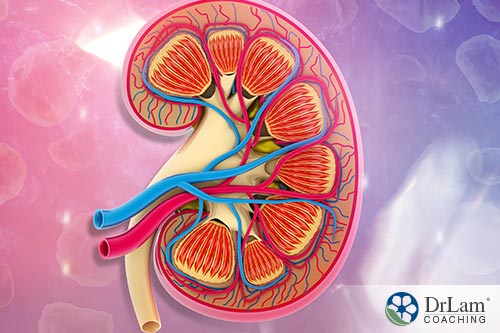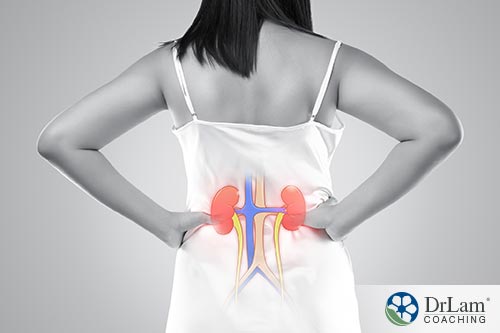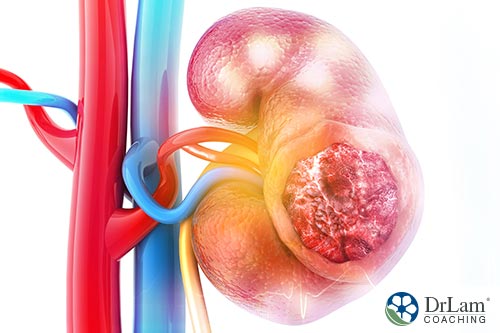 Your adrenal glands sit on top of your kidneys. As a part of the endocrine system, they control several hormone-related activities in your body. Many conditions can affect your adrenal gland function, and knowing what you might be dealing with is key to addressing them appropriately.
Your adrenal glands sit on top of your kidneys. As a part of the endocrine system, they control several hormone-related activities in your body. Many conditions can affect your adrenal gland function, and knowing what you might be dealing with is key to addressing them appropriately.
Each of your adrenal glands contains two separate parts: the outer layer called the adrenal cortex, and the inner part called the adrenal medulla. These two parts secrete different hormones that travel throughout your body as chemical messengers. Their function is to act on various bodily organs and tissues, enabling them to work correctly. All of these hormones, called adrenocortical hormones, are derived from cholesterol.
Your adrenal gland function receives signals to initiate from the pituitary gland. This gland also makes up part of the endocrine system and lies in your brain. Its main function is to control the endocrine glands.
Incorrect signals from the pituitary gland can lead to too many or too few hormones to be secreted by your adrenals. The result of this can be a hormonal imbalance and significant health issues.
Adrenal fatigue, also known as Adrenal Fatigue Syndrome (AFS), is one of these health issues. This happens when your adrenals become overburdened by stress that calls for more and more cortisol. And incorrect signals from your pituitary can significantly affect the amount of cortisol produced.
The main job of your adrenal gland function is producing and secreting hormones that affect numerous body functions. Some of these functions include:
 Three hormones come from the adrenal cortex.
Three hormones come from the adrenal cortex.
Mineralocorticoids include aldosterone. Aldosterone works to balance your body’s salt and water levels which in turn affects your blood pressure. Therefore, if this part of your adrenal gland function doesn’t work properly, your kidneys lose too much salt and water, resulting in significant dehydration and low blood pressure.
Glucocorticoids, mostly cortisol, make up the next category of hormones from the adrenal cortex. In addition to its stress-fighting properties, cortisol works to regulate your metabolism and how you respond to illness. Likewise, it stimulates the production of glucose by helping your body release stored ingredients from fat and muscle to make glucose. In addition, cortisol works to help fight inflammation. And cortisol also functions as your first-line stress-fighting hormone.
The third category of hormones coming from the adrenal cortex consists of male sex hormones. While these hormones, mostly dehydroepiandrosterone (DHEA) and testosterone, produce relatively weak effects, they do play a role in the development of the male sex organs early in childhood. In addition, they affect the development of female body hair during puberty.
Adrenocorticotropic hormone (ACTH) is released by the anterior pituitary gland and signals the adrenals to release glucocorticoids and androgens. And, to a lesser extent, it also affects the release of aldosterone.
Catecholamines come from the adrenal medulla. This category of hormones that make up part of your adrenal gland function consists of adrenaline, noradrenaline, and some dopamine. And these hormones make up a major part of the stress response, the "fight or flight" response to a stressor.
Adrenal insufficiency occurs when your adrenal gland function fails to produce enough cortisol. Three types of insufficiency can occur:
Also called Addison’s disease, this condition occurs when your adrenal gland function itself doesn’t make enough cortisol.
This disorder comes about when the pituitary doesn’t produce enough ACTH. Insufficient ACTH means the adrenal glands don’t get the signal to produce cortisol.
This condition occurs when your brain doesn’t produce enough corticotropin-releasing hormone (CRH). If the level of CRH is too low, your pituitary can’t make ACTH and your adrenals can’t make cortisol.
Several potential causes of adrenal insufficiency exist, including:
 Infections like tuberculosis.
Infections like tuberculosis.People with Addison’s disease can also experience low aldosterone levels as well as low cortisol levels.
Because symptoms of adrenal insufficiency can come on slowly, people also often think they suffer from some other condition. Certainly, conventionally trained healthcare professionals mistake adrenal insufficiency for AFS. Similarly, the symptoms for AFS come on slowly and may not show up in typical laboratory tests.
While adrenal cancer affects only about 200 people in the U.S. annually, benign tumors of the adrenal glands occur more frequently. For example, several types of benign tumors of the adrenals exist, including:
Most tumors that affect the adrenal cortex consist of benign adenomas. However, if these adenomas interfere with adrenal gland function or grow too large, they may need to be removed.
Considered rare, this carcinoma can affect the cortex or outer part of the adrenal gland.
Occurring in childhood, this cancer typically begins in the medulla, the inner part of the adrenal gland.
This neuroendocrine cancer affects the medulla resulting in high levels of adrenaline.
The American Cancer Society reports most cancers of the adrenals do not start there. But they can occur when other cancers, like breast or lung cancers, spread to the adrenals.
People suffering from Cushing’s Syndrome possess adrenals that make too much cortisol. Moreover, the typical cause of this condition is using high doses of glucocorticoids for long periods of time. Glucocorticoids are often prescribed to help relieve autoimmune conditions such as lupus and rheumatoid arthritis.
Some tumors can lead to Cushing’s Syndrome. These include:
This condition comes with birth; it’s inherited. With congenital adrenal hyperplasia (CAH), you don’t have sufficient enzymes to make cortisol. Therefore, you may wind up with little or no cortisol at all. In addition, your aldosterone levels may remain low.
Of the two types of CAH, classic CAH proves the most severe. And doctors can often diagnose this condition from birth or early childhood. Symptoms can include enlarged genitals, vomiting, and weight loss.
And without treatment, classic CAH can lead to shock, coma, and death.
However, non-classic CAH, usually mild, does not threaten life. Most of the time, the person reaches childhood or even adulthood before symptoms appear.
The symptoms associated with adrenal insufficiency come to light slowly and your healthcare professional may not recognize them at once. Moreover, this is the same issue that comes with AFS symptoms.
 Dizziness or fainting when standing up
Dizziness or fainting when standing upAnd many of these symptoms also appear with AFS. These symptoms require medical attention. Without it, you may experience an adrenal crisis.
The following signs and symptoms require medical attention. And without medical attention, an adrenal crisis may prove fatal.
Blood tests typically come first in assessing adrenal gland function. These tests measure adrenal and pituitary hormones, sodium, potassium, and glucose.
If the results indicate problems, imaging may follow. Imaging may show potential tumors, deterioration of endocrine tissue, and other possible signs.
Saliva tests are rarely done in conventional medicine due to not being FDA approved. However, it can be a good marker of adrenal fatigue when used in conjunction with symptoms if read by an experienced practitioner.
Adrenal fatigue is not a conventionally recognized medical condition. Lab tests may come back within normal limits, but symptoms persist. People with adrenal fatigue have symptoms that include fatigue, brain fog, gut issues, food sensitivities, anxiousness, and many other disconnected symptoms. This happens because the body is made to encounter acute stress, and cortisol is secreted to help deal with the acute stressor. However, in today's hectic world, we encounter chronic stress, and so cortisol output continues beyond your body's ability to produce it, eventually leading to adrenal fatigue.
Several remediation efforts can prove useful in dealing with faulty adrenal gland function. But the choice of these efforts depends on the specific disorder and cause.
For those with AFS, a more natural and comprehensive approach to the NeuroEndoMetabolic (NEM) Stress Response including herbs and supplements, and lifestyle changes may prove most useful.
 Your adrenal glands provide essential hormones that keep your body functioning as it should. And these hormones affect every aspect of your body. Some of the hormones are produced by the outer cortex of your adrenals while others come from the inner medulla.
Your adrenal glands provide essential hormones that keep your body functioning as it should. And these hormones affect every aspect of your body. Some of the hormones are produced by the outer cortex of your adrenals while others come from the inner medulla.
Potential adrenal gland function disorders can significantly affect the levels of hormones produced by your adrenals. These disorders can prompt your adrenals to produce either too little or too much of these hormones. And either of these conditions brings long-term effects on other parts of your body.
Likewise, many of the symptoms of adrenal gland function disorders come on slowly and closely resemble the symptoms of AFS. The changes in hormone levels can especially result in dysfunction of the hormone circuit of the NEM stress response. This hormone circuit consists of the adrenals, thyroid, and reproductive hormones. In order to balance out the adrenals, all three have to be in good shape.
So, if you suspect you have an adrenal gland function disorder, first consult your healthcare professional. He or she will help you choose an appropriate course of action. But, you want to be sure to consult a professional with knowledge and experience in dealing with AFS, since your adrenal glands are involved.
Your knowledgeable healthcare professional can help you understand the options regarding remediation efforts. Medications may prove helpful. However, a more natural approach may be better for some people, especially those with AFS because of the effects of some medications on AFS symptoms. In addition, you should also consider lifestyle choices, especially those that will reduce your overall stress levels. Likewise, bioidentical hormone replacement may also prove useful in helping return your hormone balance to normal. And surgery may be necessary if you are dealing with tumors or cancers.
If you would like to know more about or need assistance with adrenal gland function problems, the team at Dr. Lam Coaching can help. We offer a free** no-obligation phone consultation at +1-626-571-1234 where we will privately discuss your symptoms and various options. You can also send us a question through our Ask The Doctor system by clicking here.
Adrenal gland function is easily one of the most important aspects of good health. The hormones produced by the adrenal glands affect all aspects of your body and either too much or too little of them can bring lasting health issues. It’s important to be aware of this functioning.
